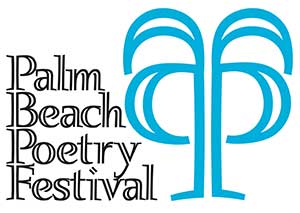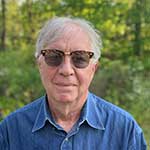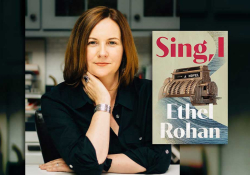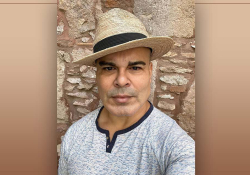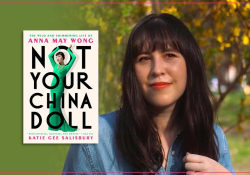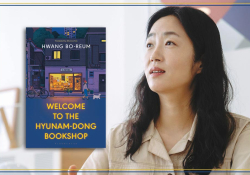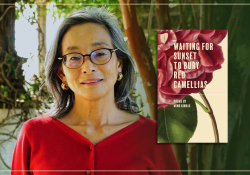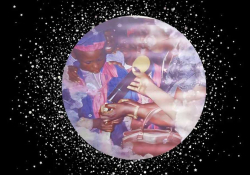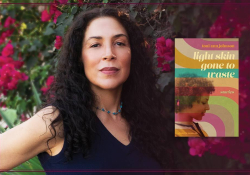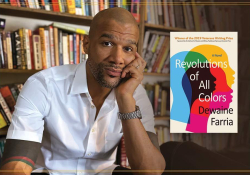The Typology of Taint, in Thrall to a Word: A Conversation with Natasha Trethewey
The following interview took place before a large audience at the Palm Beach Poetry Festival on January 24, 2014.
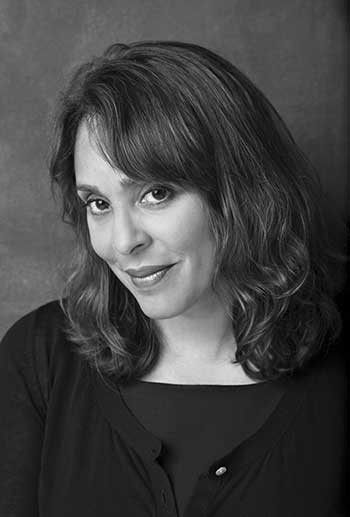
Chard deNiord: I’d like to begin with that turning point in your life when you decided to become a poet. I know you attended the University of Georgia as an undergraduate, then worked for a while as a social worker before earning your master’s degree in English at Hollins University followed by your MFA at the University of Massachusetts and additional graduate work there in American studies. But there must have been a particularly eventful moment when you decided you were going to take writing seriously and pursue it as a career.
Natasha Trethewey: You know, one of the things I’ve realized is that the more you tell a story about something, the more the story changes. And so, for that reason, I keep trying to tell the truest version of that moment to my recollection. As an undergraduate, I never took any creative writing classes. That was when you still registered by the alphabet, and by the time I registered for those desirable classes, with a “T” I never got to get into any of them. But when I left, I tried to write a poem for the first time in undergraduate school after my mother died, and it was just an attempt out of sheer necessity to make sense of that loss. It was a terrible poem, and I asked a professor of mine if I could bring it to her office to show it to her. But I lost the courage to do so, and I never did. It was a good thing because it was a horrible poem. It had this image of me . . . well, what I wrote was that I felt like I was “. . . sinking into an ocean of despair,” and the word “sinking” went down the page like that, and there was that little pool of cliché at the bottom that the word just went right into.
So I never showed that poem, and I’d been an English major, and when I graduated my father talked me into applying to Hollins, but as a fiction writer. So I went to Hollins thinking that, because I loved short fiction so much, I wanted to write stories. In my first semester I had [Marian Ganger], who’s a wonderful novelist, as a professor. I remember a friend of mine, who was a poet, daring me to write a poem. I remembered how bad this poem from freshman year had been, so I knew I couldn’t do it. But I decided to take the dare just to prove how bad it would be. I wrote the poem, and actually it wasn’t that bad, and I gave it to [Marian Ganger]—I put it in her mailbox. The next time I saw her, she came running down the hall to say, “Oh, Tasha, you’re a poet!” I think it had more to do with the fact that I wasn’t a very good fiction writer, and she was hoping that I would find a new avenue for whatever talents I might have. From then on I started writing poems. So then, you know, one turns to poems not to write them sometimes, but to read them and to be comforted by them. So there’s a different story about turning to poetry for that reason, which is also about grief for me, but a very different moment of deciding, again, to write them.
CD: This reminds me of Auden’s famous line about Yeats in his elegy for him, “In Memory of W. B. Yeats.”
NT: That “Mad Ireland hurt him into poetry.”
CD: Yes.
NT: It’s a line that I say often too, because I certainly feel “hurt into poetry.” Not just by the tremendous grief that I felt over losing my mother, but also by having been born in Mississippi in a certain period in our history, and all the things that go with that.
CD: It’s fascinating that almost thirty years after you decided to pursue a career in writing, you wrote a poem called “Calling,” which is about your call to become a poet at the early age of three. Of course you hadn’t started to write poetry then, but you define a particular moment as a significant event in your life when you, in the presence of your parents in Monterrey, Mexico, with your mother “kneeling at the altar of the Black Virgin,” received your call to become a poet. I wonder if you could read that?
NT: Oh, I’d love to.
Calling
Mexico 1969
Why not make a fiction
of the mind’s fictions? I want to say
it begins like this: the trip
a pilgrimage, my mother
kneeling at the altar of the Black Virgin,
enthralled – light streaming in
a window, the sun
at her back, holy water
in a bowl she must have touched.
What’s left is palimpsest – one memory
bleeding into another, overwriting it.
How else to explain
what remains? The sound
of water in a basin I know is white,
the sun behind her, light streaming in,
her face –
as if she were already dead – blurred
as it will become.
I want to imagine her before
the altar, rising to meet us, my father
lifting me
toward her outstretched arms.
What else to make
of the minds slick confabulations?
What comes back
is the sun’s dazzle on a pool’s surface,
light filtered through water
closing over my head, my mother – her body
between me and the high sun, a corona of light
around her face. Why not call it
a vision? What I know is this:
I was drowning and saw a dark Madonna;
someone pulled me through
the water’s bright ceiling
and I rose, initiate,
from one life into another.
CD: A remarkably mystical poem.
NT: Thank you. I think that’s part of the story of realizing that no matter how many times I try to explain the “moment” that I decided to become a poet, none of it’s exactly right—there are so many moments along the way that perhaps that moment, farthest back in the memory, is the one that initiated that genuine calling. I think of it also, in the poem, as a “calling” toward something else—toward not just the need to write poetry, but to have a particular vision about what it is I want to write, to be drawn to, as I am deeply drawn to a sense of social justice. I think that, for me, the poem is also about that particular “calling” as well.
CD: In your book Beyond Katrina you talk about not being a religious person. Yet at the same time, perhaps you possess a more insightful view ironically into what that “calling” meant to you as a nonreligious poet. I’m referring to the way you conflate your mother with the “Black Madonna” in your early memory of her in Monterrey.
I think of it also as a “calling” toward something else—toward not just the need to write poetry, but to have a particular vision about what it is I want to write, to be drawn to, as I am deeply drawn to a sense of social justice.
NT: Yes, I think that I was always drawn to language, so the language of ceremony is always interesting to me. Those words that I heard on Sundays, or during the week when the Ladies’ Group would come to my grandmother’s house for Bible study, and they also had a secular meaning outside of what I was learning. But the imagery was something that stuck with me, and I remember being fascinated about learning that my mother, after her death, a woman who had grown up in the Baptist Church, who lived her whole life across the street from the Baptist church that her aunt founded, became a Catholic convert. I never knew this about by mother, but I did know that she made certain gestures which I, of course, understood to be Catholic, and that she performed certain other rituals. But I never knew why, and when I began to think about why—I was thinking about that around the time I wrote this poem, too—I started thinking about that particular historical moment, and of course there are a lot of black Catholics in the Gulf Coast region from New Orleans to Mobile, so plenty of people she knew would have been Catholic. But I also thought that my mother might have chosen to convert because the people in the Catholic faith . . . the Church was, at that point, a little out front of integration in the South, and the Church seemed more liberal to her, perhaps, than the Baptist church she had grown up in. That would be one reason. The other reason is that I imagined that on that trip to Mexico, to be confronted with the Black Virgin—with an image of black womanhood that she would have never seen growing up in that society—might be very attractive to her.
CD: And a little exotic.
NT: That would have been before her conversion.
CD: In more secular terms, you’ve talked about your inclination to bear witness to injustice and discrimination pretty early on. There’s a poem in your first book, Domestic Work, in which you write about advice that a woman named Sugar gave you. Is that her name?
NT: That’s right. She was my great-aunt, Sugar.
CD: You write of her in your poem “Gathering”:
Under ripe figs, green,
hard as jewels, these we save,
hold in deep white bowls.
She put them to the light
on the windowsill, tells me
to wait, learn, patience.
I touched them each day,
watched them turn gold, grow sweet,
and give sweetness back.
I begin to see
our lives are like this—we take
what we need of light.
We glisten, preserve
hand-picked days in memory,
our minds’ dark pantry.
I’m fascinated by this advice to wait and learn in light of what you have called “measured syntax” and patience in your work, which you have claimed is “necessary for being able to lift that heavy arm of history up.”
NT: You know, I think of Sugar, my great-aunt, as one of my Muses in the way that the poem suggests, because of the kind of advice she’d give. She was also someone who was very precise about things, and I love precision—I think because of her. She was also someone who would convey messages to you not just with words, but also with gesture, which, of course, in the mind becomes image. I can remember a time she came to my grandmother’s back door—they lived side-by-side. We didn’t know it yet, but she was suffering from Alzheimer’s, but we just called her “senile,” not knowing anything else. So she started to lose a lot of things, so her communication became very different. I remember how she always used to make fig preserves because she had this huge fig tree. She came to the back door one day and knocked on it—the kitchen door—and I opened it, and all she did was stand there and hold out her palm, which had these three underripe figs in it. Then she said nothing, and I knew to take them and wait.
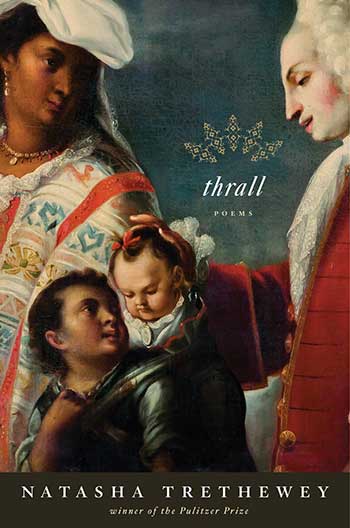 CD: And they ripened.
CD: And they ripened.
NT: Yes.
CD: I would like to turn to some of the paintings you write about in your new book, Thrall—Renaissance paintings for the most part, but also eighteenth-, nineteenth-, and twentieth-century paintings, drawings, and photographs that focus on mixed-race or casta images by such painters and artists as Juan Rodríguez Juárez, Miguel Cabrera, Juan de Pareja, Diego Velázquez, George Fuller, and Robert Frank. You follow a strategy in many of these ekphrastic poems of describing the painting, then developing your description into an extended metaphor. Which of these paintings would you like to discuss first?
NT: Do you mind if I start with the poem titled “Knowledge”? This one will allow me to talk a little bit about process and the advice we get from other writers that can be so useful. It would probably be easier to read this one than anything from the section called “Taxonomy,” because “Taxonomy” is really where this began for me. “Knowledge” is crucial.
CD: There’s a lot in this poem about your own personal history as well.
NT: Indeed. Okay, this is “Knowledge”:
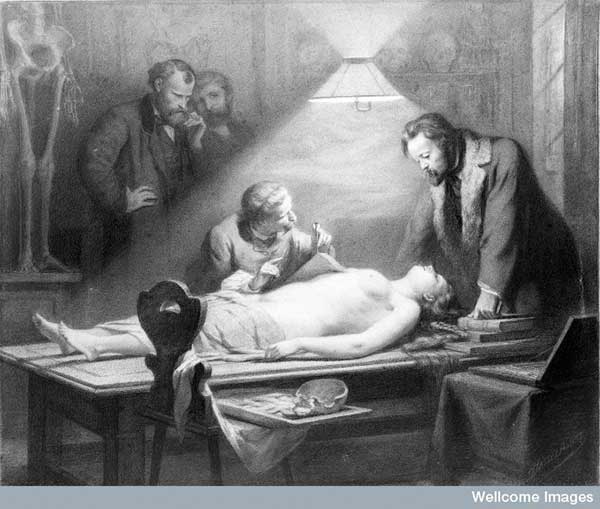
Knowledge
After a chalk drawing by J. H. Hasselhorst, 1864
Whoever she was, she comes to us like this:
lips parted, long hair spilling from the table
like water from a pitcher, nipples drawn out
for inspection. Perhaps to foreshadow
the object she’ll become: a skeleton on a pedestal,
a row of skulls on a shelf. To make a study
of the ideal female body, four men gather around her.
She is young and beautiful and drowned –
a Venus de’ Medici, risen from the sea, sleeping.
As if we could mistake this work for sacrilege,
the artist entombs her body in a pyramid
of light, a temple of science over which
the anatomist presides. In the service of beauty –
to know it – he lifts a flap of skin
beneath her breast as one might draw back a sheet.
We will not see his step-by-step parsing,
a translation: Mary or Katherine or Elizabeth
to corpus, areola, vulva. In his hands
instruments of the empirical – scalpel, pincers –
cold as the room must be cold: all the men
in coats, trimmed in velvet or fur – soft as the down
of her pubis. Now one man is smoking, another
tilts his head to get a better look. Yet another,
at the head of the table, peers down as if
enthralled, his fist on a stack of books.
In the drawing this is only the first cut,
a delicate wounding: and yet how easily
the anatomist’s blade opens a place in me,
like a curtain drawn upon a room in which
each learned man is my father
and I hear, again, his words – I study
my crossbreed child – misnomer
and taxonomy, the language of zoology. Here,
he is all of them: the preoccupied man –
an artist, collector of experience; the skeptic angling
his head, his thought tilting toward
what I cannot know; the marshaller of knowledge,
knuckling down a stack of books; even
the dissector – his scalpel in hand like a pen
poised above me, aimed straight for my heart.
You know, Mark Doty in an essay talks about how “your metaphors go on ahead of you,” and how one of the ways he begins writing a poem—this essay’s about a particular poem called “The Display of Mackerel”—is by looking at the thing that struck him, that got his attention, and just describing it in the most subjective terms possible, before he allows himself to make figurative comparisons that, of course, begin to reveal something about how he feels about the image, which then leads to a type of insight about it. So when I saw this image, I didn’t particularly know why I was drawn to it, but I knew that I had to start describing it and hope that the description of it would lead me to understand what it meant.
I begin to see that everything in that room has always been speaking to me about the nature of my relationship with my father, and about perceived and received knowledge across time and space, particularly that of the Enlightenment.
But then, as I began doing it, I got stuck because I felt like . . . you know, one never likes to repeat oneself, and to me it felt like I was writing a poem I wrote in Bellocq’s Ophelia—it had something similar to that for me. So I had lunch with Elizabeth Alexander, the poet, and I told her that I had this problem. She said to me that whenever that happens to her, she “decides to let the seam show,” meaning that in the middle of the poem she’ll say, “Why am I writing the same poem again?” as if that will become a line in the poem. Once I took that with me and sat down again, the turn in the poem happens, in which I begin to see that everything in that room has always been speaking to me about the nature of my relationship with my father, and about perceived and received knowledge across time and space, particularly that of the Enlightenment.
CD: Which is so historically patriarchal in both its artistic and scientific manifestations.
NT: Yes, and knowledge . . .
CD: “. . . knuckling down the stack of books . . .”
NT: I have this lovely relationship with my father, but it’s always also a very difficult one. I think that plenty of daughters also have relationships like this with their fathers, but I have the added bonus of my father also being my white parent, so it’s not only a gendered complexity but a racialized one as well. So my father could begin to represent this kind of “whiteness Enlightenment knowledge,” and I began to represent the “dark Other.” My father could say that his idea of truth was knowledge, and mine was the more subjective knowledge, that my knowledge was the more “ideological” knowledge and his was the “truth,” but he couldn’t see that even that position was an ideological one.
CD: Not able to see it because his eyes are too fixed on the subject or on the object?
NT: Perhaps that’s why I use the word “myopic” and “myopia” so much in this book.
CD: Yes, you write about it in your poem about a Juárez painting—the portrait of his wife and child. We’ll turn to that in a minute.
NT: Well, you know, one of the other things that comes into play is that my father and I used to give readings together a lot, and in those readings we would stand together and read poems that spoke to each other. So we would read back and forth, some twenty minutes of me and then him. I remember that whenever he would get to the moment in his poem “Her Swing,” which is a lovely poem—it’s very sweet, it makes me very happy—there would be that moment when he got to the line “I study my crossbreed child”—the line in my poem is actually a quote from that poem—I would always feel, standing there next to him, something like the Venus Hottentot on display, that all of a sudden I became that creature that was sort of turning around in her “Otherness” and difference. So the sentence to me, had two problems: one is that it had a very sort of eighteenth-century classification aspect—the need to “categorize” and “fix” everything that you study—but then another is the word “crossbreed.” A human being can’t be a “crossbreed,” so it is a sort of misnomer, and it suggests that, in the mixture, one of the partners is a little less human than the other.
CD: In your poem about your visit to Monticello with your father titled “Enlightenment,” you joke with him at that climactic point on the tour when you recall arriving at Jefferson’s slave quarters.
NT: Well, my father took me to Monticello for the first time about twenty years ago. “Enlightenment” was the last poem I wrote for the book, and I had to take him back there, I think, to finish the book and to write that poem. Just to tour the house again—many things have changed in the past twenty years. Now the official position of the Jefferson Foundation is that Jefferson fathered some of Sally Hemings’s children.
CD: Six of them.
NT: The docent will say that when you go there now. It was never discussed before, and it seemed impertinent if someone dared to ask the docent a question about it. So in the twenty years that have gone by, because they’ve acknowledged that, because they’re trying to, sort of, resurrect the slave quarters on Mulberry Row, because they do not necessarily call the slave quarters the “servants’ quarters” anymore but use more precise language, the conversations that you hear have changed. My father and I walked around there and overheard people saying things like, “Well, she was mostly white” or “How white was she?” It’s as if once it was official that he had done that, there had to be something else that made it so. That’s because, well, she was “different,” without saying she was “different”—that’s what they were saying.
CD: You quote these specific lines in particular in the poem from Jefferson: “The improvement of the blacks in body / and mind in the first instance of their mixture / with the white.”
NT: I’m quoting Jefferson there from Notes on the State of Virginia.
CD: But at that point in the tour, you say to your father, “This is where we part.”
NT: “I’ll head around to the back.”
CD: And I guess he laughed.
NT: It was one of those moments where, you know, it just becomes necessary to have a little bit of levity. But it’s also wicked of me at the same time. I think because I suppose I can just stand there while the docent says, “Imagine stepping back into the past,” instead of thinking, Really, do you want me to imagine that? Do I really want to imagine that? Things would not have been so good for me! So I make a joke out of it. It is my grandest attempt to make sure that this poem, which is very difficult on my father, as is the poem “Knowledge” that I just read, shows that we have a deeply loving relationship. It’s complicated—it really is—and that moment has to do the work of communicating this complexity in the poem. So I’m glad I really said it.
CD: Would you mind reading the entire poem?
NT:
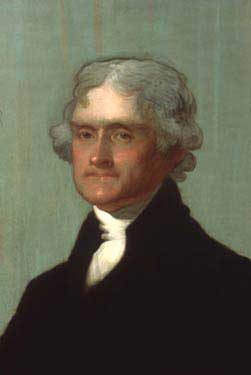
oil on wood, Monticello, Charlottesville, Virginia.
Enlightenment
In the portrait of Jefferson that hangs
at Monticello, he is rendered two-toned:
his forehead white with illumination –
a lit bulb – the rest of his face in shadow,
darkened as if the artist meant to contrast
his bright knowledge, its dark subtext.
By 1805, when Jefferson sat for the portrait,
he was already linked to an affair
with his slave. Against a backdrop, blue
and ethereal, a wash of paint that seems
to hold him in relief, Jefferson gazes out
across the centuries, his lips fixed as if
he’s just uttered some final word.
The first time I saw the painting, I listened
as my father explained the contradictions:
how Jefferson hated slavery, though – out
of necessity, my father said – had to own
slaves; that his moral philosophy meant
he could not have fathered those children:
would have been impossible, my father said.
For years we debated the distance between
word and deed. I’d follow my father from book
to book, gathering citations, listen
as he named – like a field guide to Virginia –
each flower and tree and bird as if to prove
a man’s pursuit of knowledge is greater
than his shortcomings, the limits of his vision.
I did not know then the subtext
of our story, that my father could imagine
Jefferson’s words made flesh in my flesh –
the improvement of the blacks in body
and mind, in the first instance of their mixture
with the whites – or that my father could believe
he’d made me better. When I think of this now,
I see how the past holds us captive
its beautiful ruin etched on the mind’s eye:
my young father, a rough outline of the old man
he’s become, needing to show me
the better measure of his heart, an equation
writ large at Monticello. That was years ago.
Now, we take in how much has changed:
talk of Sally Hemings, someone asking,
How white was she? – parsing the fractions
as if to name what made her worthy
of Jefferson’s attentions: a near-white,
quadroon mistress, not a plain black slave.
Imagine stepping back into the past,
our guide tells us then – and I can’t resist
whispering to my father: This is where
we split up. I’ll head around to the back.
When he laughs, I know he’s grateful
I’ve made a joke of it, this history
that links us – white father, black daughter –
even as it renders us other to each other.
CD: Such an ambitious, bold, and tender poem. On the dedication page of this book, you write, “To My Father.” Then in the first poem of the book you write a proem titled “Elegy,” dedicated “For my father.” The last line of that proem is fascinating, but I’m not sure I completely understand it. I think I do, but would you mind elaborating on it? It has a powerful, mythical ending: “I step again into the small boat // that carried us out, and watch the bank receding – / my back to where I know we are headed.”
NT: The few words that you didn’t say were, “Some nights dreaming, / I step again into the small boat.” I will just say that to the audience, because it is about recollecting that particular fishing trip again and again. So in a literal sense, it could simply mean the boat’s headed that way, but I know I’m facing the other direction, and we’ve already been there in real life, so my back is headed toward the place we are going. But it’s about going to that place, which I think is a place of knowledge, a place of finally coming to recognize something that has been germane to our relationship the whole time—that gets played out there.
So it is a way of thinking about having to go down that path again—to see again everything that has brought us to the moment where we are. The “moment we are” is the difficult moment when I am the ruthless daughter who, rather than experience fully the moment of fishing with my father, is already thinking of how it will be a poem when he’s gone. When I say in the poem, “Your daughter, I was that ruthless. What does it matter if I tell you I learned to be?”—the “learning to be” comes, of course, from my father, and my father was a poet. And all my life with my father, we would be having a conversation, and then he would just “check out” for a little while, pull out the notebook he kept in his pocket, and write something down. I was always certain I had said something that made him need to stop and record it for a poem he would write. So I never quite felt that he was “always there.” And yet there in the poem, in the fishing trip, I’ve learned to do the same thing, and I’m going to make use of it. I know that there is something not wholly savory about that, but for me it’s Yeats’s “Of the quarrel with others we make rhetoric, but of the quarrel with ourselves, poetry.” So I have to acknowledge my own culpability and willingness to also make use of him.
CD: The poems in Thrall represent a leap for you into what you call the “ruthless” or truth-telling voice that pervades this book. You acknowledge your ambivalence toward your father in “Elegy”—the book’s proem—but then seem to acknowledge him in your poem “On Happiness,” near the end of Thrall, as the person who bequeathed the “permit” of poetry to you.
NT: That’s interesting to think of—I think you’re right, certainly.
CD: You write, “I would give you happiness if I could”—that unattainable fish, the salmon, that always slips out of your hands before you can let it go— and then conclude,
. . . and then is to recall the permit
he paid for that morning, see it
creased in my back pocket – how
he’d handed it to me
and I’d tucked it there, as if
a guarantee.
NT: You know, I’m really glad you brought that up. Because I am focused on writing about the literal image and because I write from experience, I try to capture something precise about the experience, the literal aspect of it. We actually had to buy our fishing permits that morning, and we got salmon licenses. We did not get trout licenses, which is why in the previous poem I had to throw the trout back—we didn’t have a license for trout. But what happens is that, figuratively, it really does mean something else, doesn’t it?
CD: I didn’t want to read too much into it.
NT: But after everything I’ve been saying, how could you not?
CD: You’ve moved from the “unattainable salmon” to the literal “permit.”
NT: Well, all I can say is that it really happened. But I know enough—and you would tell your students this—to know that it’s not simply that it happened: it is what else you can make of it. And I believe that if we’re precise enough about what really happened, we can find what is figuratively true and emotionally true in another way. I just saw an interview with Stanley Plumly in which he says, “Why not just say what happened?” Sometimes saying what happened can lead us to . . .
CD: That’s actually a line from Lowell’s “Epilogue”: “Why not say what happened?” It’s an enormous temptation, is it not? I love the way the “permit” is “folded” sort of “casually” in your “back pocket,” and you end the poem with that. In contrast to those poems about your father and the Enlightenment and patriarchy and knowledge, you write a moving poem about your mother called “Mano Prieta,” which is more imagistic, and I wonder if you could read that as a contrast to what we’ve just been talking about.
NT: Sure. I want to come back to what you’re saying, because of course the book is very much about inheritance and where certain things come from, which is sort of why we started with “Calling.”
Mano Prieta
The green drapery is like a sheet of water
behind us – a cascade in the backdrop
of the photograph, a rushing current
that would scatter us, carry us each
away. This is 1969 and I am three –
still light enough to be nearly the color
of my father. His armchair is a throne
and I am leaning into him, propped
against his knees – his hand draped
across my shoulder. On the chair’s arm
my mother looms above me,
perched at the edge as though
she would fall off. The camera records
her single gesture. Perhaps to still me,
she presses my arm with a forefinger,
makes visible a hypothesis of blood,
its empire of words: the imprint
on my body of her lovely dark hand.
So, one of the things I was thinking about is the backstory here. In recent years, it has occurred to me that the more I gained a reputation as a poet, the more people wanted to attribute any success or talent that I’ve had as a poet to my father, because my father is a poet. It’s a natural impulse for people to do that, but it’s very complicated for me because, as I mentioned earlier, it’s gendered and it’s raced for us. When I was growing up in the Deep South, if I did anything well white people would say, “Oh that’s your ‘white’ side,” as if nothing good came out of the part of me that was “black.”
CD: Well, that’s right out of Enlightenment thinking.
NT: Yes, and it drove me crazy. In recent years, it’s gotten even more pointed in that the thinking seems to be because my father’s my “white” parent, he’s also my “poet” parent, so surely all this comes from him and has nothing to do with the “imprint” of my mother’s “dark hand” on me. So one of the things in my mind when I was working on this book, which I’m not sure if people see or not, is in a poem like “Calling.” What I’m trying to suggest is that it may be literally true that my father’s a poet, but what drives me, what calls me to be a poet—that utter necessity—may have come from the other side.
CD: I think that’s in “Calling.”
NT: Yes, and I think my mother is being “erased” as a part of what made me—she’s been dead a long time now, so she’s been “erased” in that sense. And attributing my calling to be a poet only to my father is another kind of erasure. If you notice, in all the casta paintings, whenever there is the “black African mother” she is either so black that she has no face or otherwise is erased, and the gestures of the father always seem like dominion. A hand draped casually—that’s ownership, or something like that. I didn’t know that was what I was seeing in the paintings at first and what I had been feeling about what was happening to my mother. You don’t know until you start writing the poems.
CD: How would you respond to those who feel you characterize the Enlightenment in poems like “Enlightenment” as a “male” dominated epoch that, for all its intellectual and scientific advances, was also racist?
NT: You know, I think I’ve never actually said that the Enlightenment was “male” or “racist.” I think that that’s sort of the perception which might have come, but when I introduce those poems and talk about the Enlightenment, what I talk about is how good the Enlightenment was and how much it gave us, but there is complexity in that it also began to codify for us the ideas of racial difference. What’s interesting to me about the Enlightenment is that it did both of those things together, at the same time. So what I’m interested in in Thrall are the ideas that come to us from the Enlightenment about racial difference—these deeply engrained and unexamined notions of “white supremacy” and the twin “black inferiority” that we see manifest around us all the time, and come to us from the language of the Enlightenment. How can something so wonderful do something so not wonderful at the same time? It’s like, how can my beloved father also harbor notions of my “difference”—that is, a “difference” which is also “less than”? How do those two things go together? My father loves me, but does he also maybe think that the “improvement of the blacks in body and mind comes in the first instance of their mixture with the whites”? Is it possible to hold two ideas like that at once? Absolutely.
When I’m called a “crossbreed,” it’s a parsing of me as well, and it is rooted in the grammar and syntax of the body and of ideas about race, about difference across time and space.
CD: In one of these casta paintings you write about, De Español y Negra; Mulata, by Miguel Cabrera, the woman’s face is so black that it eclipses the light.
NT: That inheritance and where it comes from is what created the “Calling.” This is a book very much about parsing as well, which is why “Knowledge” becomes such an important poem—the woman on the table is literally being parsed, being minutely examined, dissected. When I’m called a “crossbreed,” it’s a parsing of me as well, and it is rooted in the grammar and syntax of the body and of ideas about race, about difference across time and space. There’s also the parsing of Sally Hemings when visitors to Monticello, in the poem “Enlightenment,” are trying to figure out the proportions of whiteness. Then there’s Dr. Samuel Adolphus Cartwright, who is dissecting a white-skinned Negro to “prove” the “essence of black inferiority” that he is sure is there.
CD: You write about that “dark imprint,” as well as the “dark pantry” of your mind. The word “darkness” occurs in about every other poem of yours. I find that it works as an effective echo in your work. In addition to the “dark imprint” and “dark pantry of the mind,” there’s also “the “dark subtext,” the “dark Madonna,” the “dark earth” . . .
NT: Well, I like to think that’s true because it’s different every time.
CD: You also write obsessively about the past as a “witness.” You quote Hegel in Beyond Katrina: “The past is a ruin.” But you add that it lives in images. You write that it returns as an iconic “red feather” because we can’t ever get it right exactly. It’s fictive, yet also real. There’s the fictive metanarrative about the past juxtaposed with the true narrative of the past. As a “witness,” you talk about the importance of including what the official document omits from the lost narrative. One of your tasks as a poet is to fill in those omissions. You use the words “palimpsest” and “scrim” repeatedly as if you have to look through a curtain in order to see the past—the “Pentimento” you often call it. “What is home but a cradle of the past?” you write in your poem “Prodigal.” Memory and forgetting are intertwined. You acknowledge that we live with forgetting and remembering, while feeling at the same time the compulsion to “get it right,” to tell the true narrative of what’s happening on Route 49 in North Gulfport. You bear witness to what’s lost and erased, resigning yourself to that one moment, but also trying to remember, feeling compelled to remember, because if something vital and invaluable is lost, like home or a parent or a community, then there’s an integral part of you, the witness, but also us, your reader, that’s lost, in both real and vicarious ways.
Part of what I’m trying to do is to tell fuller versions of history, which Americans can and should be proud of because it is our shared history.
NT: Right. I think that my relationship to the past is one in which I want to restore those narratives—those things that have been forgotten and erased. Sometimes it’s more like what Robert Hayden wanted to do, which was to correct some of the misapprehensions about history, African American history in particular. When people don’t know the fuller versions of history, they can make all kinds of assumptions about people and their nature. It was remarkable to me, in researching the Civil War for my book Native Guard, how many people had no idea that nearly 200,000 African Americans fought in the Civil War. I was told once—by someone people would have expected to be well-read and knowledgeable—that the biggest problem with blacks in America is that “they’ve never had to fight for anything that they’ve received.” As if they had only been passive recipients of white benevolence—not people who had fought and died to help advance this country to a fuller realization of its creed. I hear these things all the time. So part of what I’m trying to do is to tell fuller versions of history, which Americans can and should be proud of because it is our shared history.
In a more personal dealing with the past, with the necessity of making sense of it and remaking it again and again as we do, I think it goes back a little bit to watching my father pull out those notebooks. I think that what he was writing, in his thinking, became part of the official document. I’ve seen my father struggling with memory over the years, without him knowing how much he’s lost, and one of the things he’ll say to me is, “Tasha remembers everything, whether it happened or not.” I’ve sort of struggled against that—I’ve struggled against this great umbrella of tradition and knowledge that he seemed to have that could always somehow undermine any story or experience that I had, as if I couldn’t have perceived my own experience accurately. That someone else could and I could not.
So to write it is also to create a little bit of a historical record. And as I try to write nonfiction about my own past, one of the things that occurs to me is that what is truest is perhaps not my re-creation of the past, not an autobiography of my past, but an autobiography of my mind at this moment needing to make sense of whatever I recall and how I recall it. That’s probably the truest thing, and that takes us back to what is true and the questions I ask in the poem “Calling”: “Why not make a fiction / of the mind’s fictions?” We know that the mind works instinctively to forget; we couldn’t survive if there weren’t things that we forgot. Then there are things that we try to forget but can’t, as well as the things that we rewrite without knowing that we’ve rewritten them, and they allow us to have another truth. So if my father’s guilty of that, certainly I am too.
What is truest is perhaps not my re-creation of the past, not an autobiography of my past, but an autobiography of my mind at this moment needing to make sense of whatever I recall and how I recall it.
CD: But you’re really taking a close look at these paintings, which are both fictional and mimetic.
NT: Well, I think you try to do that by thinking about what Mark Doty said, again: that just beginning to describe before making those figurative comparisons will show you how you feel about things. Many people will never see the images, except for what is on the cover. The risk is that if someone were to look them up, she might say, “Well, wait a minute. I don’t see it like that at all.” The fact that I describe a man who’s “knuckling down a stack of books” has everything to do with how I see it.
CD: The “knuckle” . . .
NT: Yes, as in: Who owns history? Who owns knowledge? The one who can knuckle it down like that.
CD: There are key moments in your poems, as well as in Beyond Katrina, where you decide just to “be quiet.” You know that what someone has said is offensive or untrue or outrageous, and yet you, maybe for reasons that you weren’t aware of at the time, decide to say nothing. Would you mind reading “Southern History”?
NT: Sure, as an example of my silence.
CD: Yes. We could also talk about the waiter who felt that Katrina “cleansed” the coast.
NT: That was the narrative we heard a lot.
CD: And you weren’t able to say anything at the time.
NT: No, I didn’t, because I didn’t want to shut him down. I wanted him to keep talking so I could hear his story, his version of things.
Southern History
Before the war, they were happy, he said,
quoting our textbook. (This was senior-year
history class.) The slaves were clothed, fed,
and better off under a master’s care.
I watched the words blur on the page. No one
raised a hand, disagreed. Not even me.
It was late; we still had Reconstruction
to cover before the test, and – luckily –
three hours of watching Gone with the Wind.
History, the teacher said, of the old South –
a true account of how things were back then.
On screen a slave stood big as life: big mouth,
bucked eyes, our textbook’s grinning proof – a lie
my teacher guarded. Silent, so did I.
My husband’s a historian, and the one thing that bothers him about that poem is that I take a measure of blame for keeping silent. He recognizes that when you’re a pupil in a classroom you may not have the power to speak up and contradict authority. Still, I’m trying to accept responsibility for the silence I maintained, even as there were reasons I felt I couldn’t speak up in that space. I think it’s better to put at least some of the blame on myself, which goes back to my thinking about Yeats.
CD: And that waiter’s comment—you write that you weren’t quite sure what he meant, giving him the benefit of the doubt.
NT: Well, I think it was a combination of those things. I think it was an act of kindness as well as giving him the benefit of the doubt. What I encountered when I was there was that so many people wanted to talk about what had happened, and I found that what I wanted to be was a listening ear. I wanted to hear people’s experiences of the storm and its aftermath without judging them or arguing with them, so that I could make sense of all the different things that they might’ve felt. . . . I think, in some ways, that’s one of the things you have to do to be a decent documentarian—to not necessarily interfere in that moment. I wanted to hear what he had to say, and I didn’t want to do anything that would ruin what we’d built up over the time that he had been waiting on me and my brother. As it was, he felt comfortable talking to us, and I think he felt comfortable enough to say what he really thought.
CD: Speaking of your brother Joe, you write about the silence you kept with him as well for a while, not intentionally in not writing to him, but getting these wonderful letters from him, and then not always know how to write back but then realizing that he needed to hear from you. You confess movingly to yourself and him, “How can I live when my heart’s in prison?”
NT: There were things I didn’t want him to know, how frightened I was, how hard it was for me. What I tell myself—and I think I talk about this in the book—is that I did everything I could for my brother in terms of working to get him released as well as providing things he needed. I would send him what he asked for and would make sure there was money for the commissary. I would make sure that he had packages of books and articles to read, but I wrote him no letters, which I came to understand would have probably meant more to him than the objects—the things that I sent—socks and boot insoles. But I think that if I had written him, I couldn’t have held back all the fears that I had about him being there—everything that worried me—and I wanted to present a face of strength and resolve so that maybe he could feel safer not having to know that I believed there was something to be worried about. So even when talking to him on the phone, I had to fill time with things that didn’t go down a certain path.
CD: Did he understand?
NT: Oh he did, yes. Writing the book made me realize all sorts of things—about myself, and my relationship to memory and to the past, and to nostalgia in particular. But in order to write it, I had to have conversations that broke those long silences with my brother. So now we don’t have those silences anymore. I think they’re dangerous.
CD: You talk about the “treachery of nostalgia” in your poem “Odysseus.”
NT: That’s right.
CD: You tell a wonderful story in Beyond Katrina about you and your grandmother while you’re out shopping, She sees an old friend who doesn’t know you and introduces you as “Nostalgia.”
NT: The other woman introduces her granddaughter first, saying that it’s her nickname but that her real name was something far more exotic and fancy. So my grandmother says, “Well, Tasha’s real name is Nostalgia.”
The metaphorical possibilities of this moment say something to me about my own relationship to the treachery of nostalgia—to want to go back to something that never existed at all, to have created it so fully in your imagination that you can’t even see where you are or where you’re going.
CD: She thought it was true?
NT: She knew that wasn’t true! I don’t know why! But the fact that she said it made me think, Hmm, I’m upset because I just got called out! It made me think, Why would my grandmother say that? But more importantly, the metaphorical possibilities of this moment say something to me about my own relationship to the treachery of nostalgia—to want to go back to something that never existed at all, to have created it so fully in your imagination that you can’t even see where you are or where you’re going.
CD: In closing, I would like to talk a little bit about your poem “Theories of Time and Space,” which is kind of a credo for you in some ways.
NT: It is. Well, it’s the opening of two of my books. I ended up starting Beyond Katrina with it as well. It’s also the first poem I wrote for Native Guard. I was thinking of it figuratively when I wrote it—the idea that you can’t go home again, you can’t go back to the places you left behind, not because they’re changed, but because you are. I was struck by Flannery O’Connor’s words: “Where you came from is gone, where you thought you were going never was there, where you are is no good unless you can get away from it.” When I turned in this book to my publisher in March 2005 I was still thinking figuratively, but by the end of August 2005 the poem had become quite literal to me because my hometown, Gulfport, Mississippi, had been wiped out by Hurricane Katrina.
Theories of Time and Space
You can get there from here, though
there’s no going home.
Everywhere you go will be somewhere
you’ve never been. Try this:
head south on Mississippi 49, one-
by-one mile markers ticking off
another minute of your life. Follow this
to its natural conclusion – dead end
at the coast, the pier at Gulfport where
riggings of shrimp boats are loose stitches
in a sky threatening rain. Cross over
the man-made beach, 26 miles of sand
dumped on a mangrove swamp – buried
terrain of the past. Bring only
what you must carry – tome of memory
its random blank pages. On the dock
where you board the boat for Ship Island,
someone will take your picture:
the photograph – who you were –
will be waiting when you return.
That last image is literal. Before you get on the boat, there is a man taking pictures that he will develop while you are out spending a few hours on the island. You can buy the photograph when you disembark, but you’re not the same person in the picture anymore because of those three hours. What remains is the evidence of constant change and inability to return to the past.
January 2014
Editorial note: Unless otherwise noted, all poems are from Thrall (Houghton Mifflin Harcourt, 2012) copyright © 2012 by Natasha Trethewey. “Gathering” is reprinted from Domestic Work (Graywolf, 2000). “Southern History” and “Theories of Time and Space” appear in Native Guard (Houghton Mifflin, 2006). To read more about Trethewey’s life and work, visit the Blue Flower Arts website. Audio recordings of Trethewey reading “Knowledge,” “Enlightenment,” and other poems at the 2013 Southern Literary Festival can be found here.
